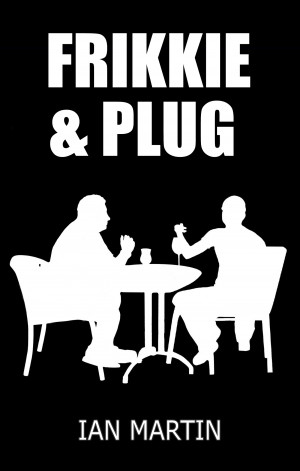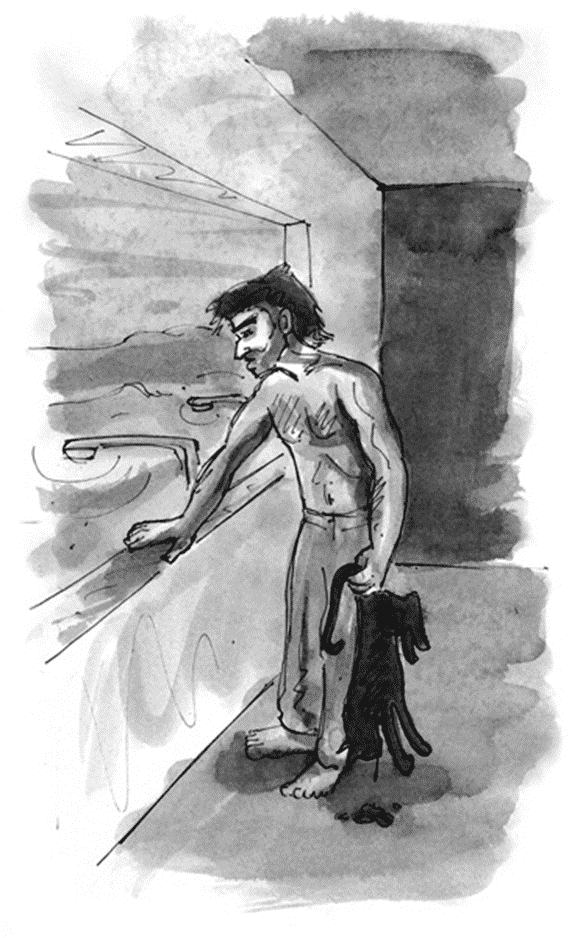This photograph of the Gough 26 team was taken in October 1980 shortly before the Agulhas departed with the members of Gough 25 and the PWD (Public Works Department) workers. The man on the extreme right was an Army chaplain and not part of the team. (I think God had wangled a free trip for him on the pretext of him being needed to perform the last rites for anyone unfortunate enough to kick the bucket while so far from civilization. He too returned to Cape Town with the ship.)
I can be seen standing on the left with a morose look on my face. At the back are Barney Barnard and Thys Kotze, and in the middle are Gordon McIntyre, Peter Stockwell and Kevin Brito. Squatting in front are Ray Holland and John Stone.
In contrast to John’s, my right hand is hanging limp and relaxed, while his is cupped, as if he was holding something about the size of a cricket ball. The explanation for this is that he was recovering from a recent injury to that hand and he had lost all feeling in his thumb. The accident had occurred right at the beginning of the takeover period some three weeks prior to when the photo was taken.
It was after the evening meal and he was reclining in his lower bunk with a drink on the bedside locker. The other occupants of the room were at least half drunk and in a boisterous mood. Two of them began a wrestling match in the top bunk and as John reached out for his drink one of them fell from above. The bulk of the man’s weight landed on the locker as John picked up his drink. The glass broke in his hand and inflicted a deep gash in the palm just below the thumb.
As I was supposed to be the medic, I was called upon to attend to the casualty. The situation did not look promising on three counts: I had been drinking, I had never done any suturing before and, even then, my eyesight was far from sharp. I was however a better bet than the Gough 25 medic, who was also drunk and had no training other than in the gelding of horses as a veterinary assistant in the Cavalry Corps.
I told all onlookers to stand back and stop breathing toxic fumes onto the open wound and went to work. First, I thoroughly washed and sanitized the gaping flesh with a liberal application of Dettol solution that stung like hell but was necessary. I filled a syringe with Lignocaine local anaesthetic and injected small quantities into several sites either side of the torn skin. I said we should now wait ten minutes for the drug to take effect and someone thoughtfully brought me something to steady my nerve.
I knew that I was incapable of performing any fancy stitchwork so I just took the curved needle and did some sewing the way my mother had shown me. Six stitches seemed sufficient, I wiped my brow, knocked back the rest of my brandy and Coke and got on with the easy part of the operation. A liberal amount of Bactroban antibiotic ointment, a surgical dressing and a crepe bandage to hold it in place and protect the cut, and I was nearly done with the patient. All that was needed was to provide him with a sling to keep his hand elevated and out of harm’s way.
Having spent more than a year at SANAE in the Antarctic and a year on Marion Island John was well qualified for the role of team leader. He also served as diesel mechanic, which meant that he was responsible for keeping the generator in good running order, ensuring an uninterrupted power supply. Despite his injury he continued to perform his duties, struggling one-handedly for several weeks until he regained the use of his right hand.
After returning to Cape Town the team members parted ways and for more than 30 years, I heard nothing from him. Then, out of the blue, a phone call. John Stone. He was on his way to Suiderstrand, near Agulhas. Would it be convenient if he called in at Pearly Beach?
We did some reminiscing, the way old toppies do, and he showed me his hand. There was no trace of a scar. Furthermore, he had regained full sensation in his thumb, much to the surprise of more than one member of the medical fraternity who had been told about what had happened. John seemed to think that I had contributed to his full recovery and we agreed that the happy outcome bordered on the miraculous.
This photograph was taken just before we left the island. Kevin is not present because he soon realised that he made a mistake and was temperamentally unsuited to a life of extreme isolation and managed to get passage back to South Africa with a fishing trawler heading that way.












